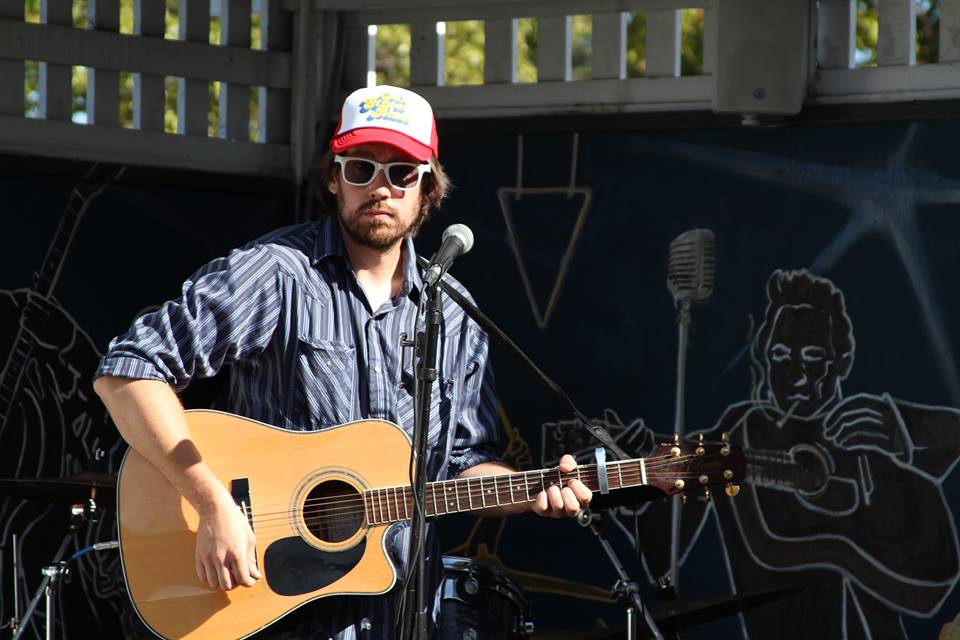Interview: Chris Hall Talks Higher Education, Musical Education and Oak Street Blues
All the latest guitar news, interviews, lessons, reviews, deals and more, direct to your inbox!
You are now subscribed
Your newsletter sign-up was successful

Since their formation in 2009, Oak Street Blues — guitarist/vocalist/founder Chris Hall, bassist Jenny Arias, keyboardist Stephanie Sheer and drummer Alejandra Arellano — have become known for their unique mix of traditional country and alternative rock combined with elements of electronic and pop.
Last year, the group released a well-received full-length album, Waiting For Something, which kept them busy with tour dates and promotion.
Chris Hall is opting for a unique follow-up: two seven-song EPs, one rock and one electronic, that he is recording with producers Warren Huart and Skip Saylor, respectively. The band members are joining him for background and harmony vocals, as well as some instrumentation.
When he’s not onstage or in the studio, Hall puts his college degrees to use in the corporate world by working for an insurance company. In this interview, he discusses the benefits of higher education, the progression of his musical education and how both come into play with Oak Street Blues.
GUITAR WORLD: You have a degree and a day job. How rock and roll is that?
I have a master’s degree — a math degree and an MBA — and I work for Anthem Blue Cross. Yes, the evil health insurance company! All pop music nowadays is so corporate, and the only way it seems anyone gets ahead is when huge record labels … I assume they drop a ton of cash to make them stars and advertise them on every facet that’s available. I know so many bands, and it seems like the majority play shows for their three friends every once in a while. It doesn’t seem like anyone goes anywhere. You have to be your own record company, make money and invest it in yourself. I decided to take that route and also have a job to fall back on if the music doesn’t work out.
Has the MBA helped in terms of running your own label?
All the latest guitar news, interviews, lessons, reviews, deals and more, direct to your inbox!
I know it has helped me, but I always feel like when you go to school, you don’t really learn anything. The one thing you do learn — and I just contradicted myself — is the way to think. You take classes and they give you information that you’re never going to use, but they show you the way to think. In business, a lot of stuff is trial and error. You do analysis on what is and isn’t successful.
There are certain degrees of success, and you say, “This is a C+ on the success scale, so let’s continue doing it unless we have something better.” I think it taught me a better way to think and analyze different strategies to reach the market and develop more in that term.
Did music take a back seat while you completed your education?
I had a music scholarship at Cal Lutheran and I played in their jazz band. I didn’t have a band or think I was going to do music. After graduating, I ran into a few guys and they said, “Let’s start this gangsta rock group.” We promoted the hell out of it, and locally, everyone seemed to dig the fact that three white dudes were throwing down these rhymes with ’80s solos. I stuck to doing the music thing and then started my own project, Oak Street Blues.
While I was getting my MBA there wasn’t a lot of time to do the band thing, so it took a back seat for a year or two. I graduated in 2010, and it’s been pretty much full force with this band, playing two shows a week, recording, writing songs and promoting ourselves any way we can.
How did you put this project together? Is this the band you always envisioned in terms of sound and direction?
When we were doing the gangsta rock thing, the good thing is that I could crank out a song in a few hours, teach it to the band and it was ready to play. Basically, everything you want to write about is set. It could get a little boring, so I always envisioned having my own band where we could expand the topics to sing about. Most of the topics are some kind of love song, but we’re not limited to that. On the project with Warren we have a song called “Gangsta Party,” and it’s like my old songs, talking about going to a party and having a good time. With this band I’m not limited. I have more things to sing about.
You write, play guitar and sing. When did you add all the components?
I started playing guitar in junior high. I had a false start. My dad owned a guitar and he gave me a guitar in second grade. He gave me lessons and I did not want to do it. I didn’t want to practice. In junior high I knew a kid who had a guitar, and that kid, me and another kid decided to start a band. I said I would learn to play guitar. I had my acoustic, I practiced every day and I got semi-good enough. I got an electric and we started a band. That was the goal.
I don’t think there was an idea that we were doing it because we loved music so much. We just wanted to start a band. The funny thing is that the kid who owned the guitar motivated us to learn how to play instruments, and he was the only guy who didn’t learn how to play, so he was never in the band. In junior high I was in a transition phase because I was really into rap music and the classic rock thing.
The gangsta rock band was nothing new for you.
No, not at all. The other guy and I liked Eazy-E, Dr. Dre and Snoop Dogg, so anytime we could play, we were all about that.
When did you begin to hone all those skills and understand what it takes to excel in all those areas?
It took me about 10 years to get good. You start on guitar when you’re young, you try to start a band, no one wants to be a singer when you play guitar. Whoever has the most leadership abilities steps up and sings, even though they probably suck at singing. That was me. No one wanted to sing, so I did it. Usually you’re not very good at playing other people’s songs, so you write your own. It started in junior high and high school bands.
I still kind of sucked at songwriting and singing. Then a few years go by, and after all that practice, you’ve written about a hundred songs and they get better. It takes time. You realize what keys you sing better in and how you sing. I still don’t think I’m that great of a singer, but I do it because I write songs that I can sing. In our band, Jenny is probably the best singer out of all of us. I sing and she puts harmony over it and it’s awesome. So time and practice make you better.
Read more of Chris Hall’s interview right here.
— Alison Richter
Alison Richter interviews artists, producers, engineers and other music industry professionals for print and online publications. Read more of her interviews right here.
Alison Richter is a seasoned journalist who interviews musicians, producers, engineers, and other industry professionals, and covers mental health issues for GuitarWorld.com. Writing credits include a wide range of publications, including GuitarWorld.com, MusicRadar.com, Bass Player, TNAG Connoisseur, Reverb, Music Industry News, Acoustic, Drummer, Guitar.com, Gearphoria, She Shreds, Guitar Girl, and Collectible Guitar.
